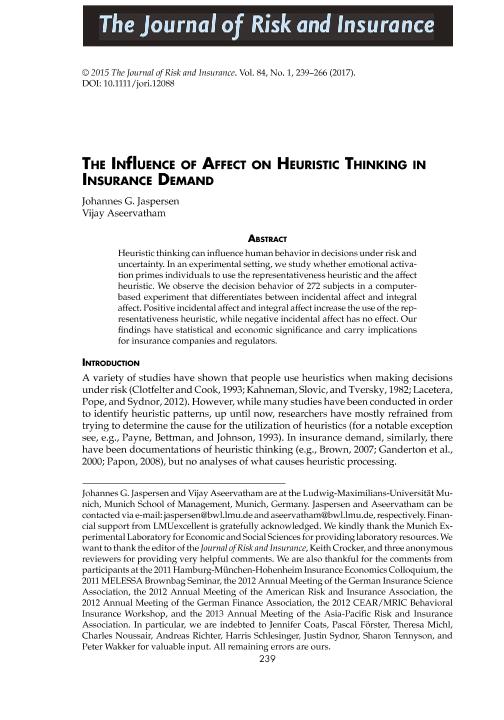The Influence of affect on heuristic thinking in insurance demand

Contenido multimedia no disponible por derechos de autor o por acceso restringido. Contacte con la institución para más información.
| Tag | 1 | 2 | Value |
|---|---|---|---|
| LDR | 00000cab a2200000 4500 | ||
| 001 | MAP20170008781 | ||
| 003 | MAP | ||
| 005 | 20170405151622.0 | ||
| 008 | 170314e20170301esp|||p |0|||b|spa d | ||
| 040 | $aMAP$bspa$dMAP | ||
| 084 | $a7 | ||
| 100 | $0MAPA20150015051$aJaspersen, Johannes G. | ||
| 245 | 1 | 4 | $aThe Influence of affect on heuristic thinking in insurance demand$cJohannes G. Jaspersen, Vijay Aseervatham |
| 520 | $aHeuristic thinking can influence human behavior in decisions under risk and uncertainty. In an experimental setting, we study whether emotional activation primes individuals to use the representativeness heuristic and the affect heuristic. We observe the decision behavior of 272 subjects in a computerbased experiment that differentiates between incidental affect and integral affect. Positive incidental affect and integral affect increase the use of the representativeness heuristic, while negative incidental affect has no effect. Our findings have statistical and economic significance and carry implications for insurance companies and regulators. | ||
| 650 | 4 | $0MAPA20080591182$aGerencia de riesgos | |
| 650 | 4 | $0MAPA20080586294$aMercado de seguros | |
| 700 | 1 | $0MAPA20170004004$aAseervatham, Vijay | |
| 773 | 0 | $wMAP20077000727$tThe Journal of risk and insurance$dNueva York : The American Risk and Insurance Association, 1964-$x0022-4367$g01/03/2017 Volumen 84 Número 1 - marzo 2017 , p. 239-266 |

